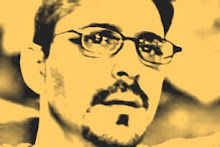Lost Post
I posted this in my notes on Deleuze awhile back, but I thought to put it up here, too, with a minor change or two...
I’m becoming increasingly more interested in a different notion of authorship, a notion that plays off of Barthes’ (in)famous essay, “The Death of the Author.” Rather than either arguing with Barthes’ “author-as-scriptor” theory, or ignoring it completely, I’ve found that passing through the essay has been creatively productive. “Passing through” the essay? Yes, just passing through. The via in vita, without the cross.
So far as I can hear it, a line of flight is creatal due, fundamentally, to D & G’s conception of Lacanian desire, a conception that is built upon the premise of lack; in other words, desire is an effect of lack, a condition within which one lives. D & G, however, consider desire in terms of flows, i.e., flows or made passages of desire in which, and through which, we become; in other words, we are always already in desire, saturated by a desire that creates the condition for our desiring. Via desire is desiring. C’est la vie.
What does desiring have to do with “the” author? If desiring is becoming, then the singular “I” or author is a multiplicity of voices, a rhizomatic self that is, essentially, a morphological entity. What if we were to take Barthes’ at his word, so to speak, and agree that the author is dead? Could we not conceive of an author as a specter, rather than a scriptor?Of course, Deleuzean philosophy is that of life. But who is to say that dead is dead? Who is to say that death is not another form of life? Why is it that we think of these two terms, life and death, as either antagonistic or dialectical? There is no death. There never has been, and there never will be. The Big Promise of Judeo-Christianity is of everlasting life, to which I do not refer. We are always already living. The notion of everlasting life is not a carrot dangled before us—not that which we lack and thus desire—but that which we are in, and are saturated by, that which we pass continually through. Closure is the mightiest fallacy of metaphysical thought, for it not only promoted societies of enclosure, but it also carried over into societies of control, societies that have seen the illusion of closure breaking up—i.e., breaking up the way a signal breaks up, turning distortedly into indistinct noise—since World War II. We are becoming, and becoming is ephemerality par excellence. This is no secret. In the Sumerian epic Gilgamesh, Utnapishtim says as much: “From days of old, there is no permanence.” Permanence—that which is fixed and unchanging, unified and unbroken—conditions the notion of death.
In this way, do we then come to a different understanding of the specter? The specter is a kind of body without organs, a short-term idea that is neither here nor there, a morphological entity that is constantly in flux and which, by dint of its ephemerality, is fundamentally deterritorializing. The author-as-specter is impermanent, and in actuality not the terrorizing and haunting thing that returns from death, but rather a very real, yet intangibly creatal matrix of meanings that becomes in various speeds and durations of time. Spectral authors are like gossamers, in that they are diaphanous, so thin as to transmit the light of becoming.

